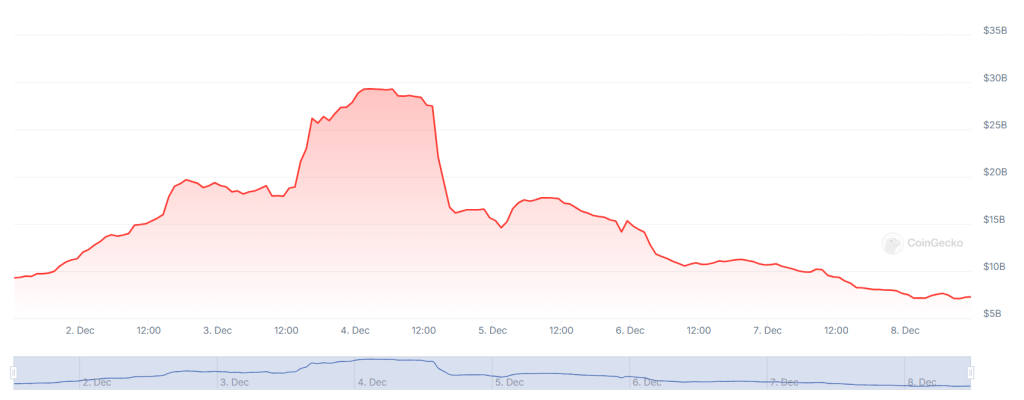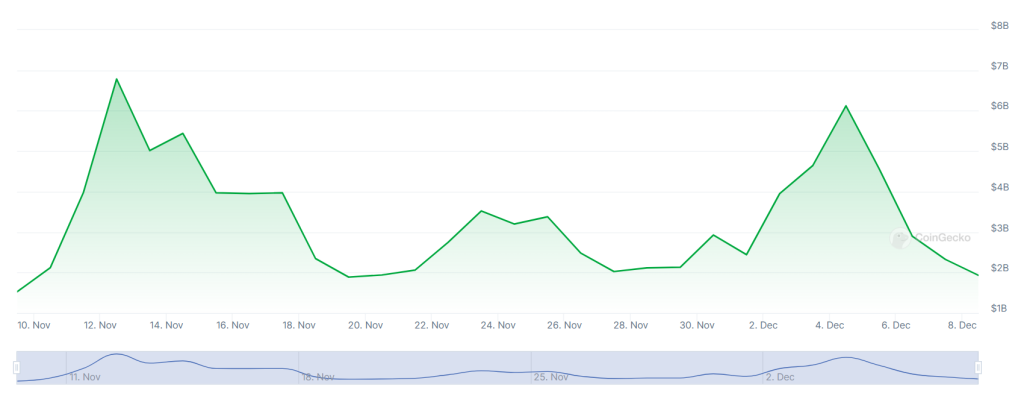A South Korean expert says panicked investors thought their crypto was under threat when President Yoon Seok-yul declared martial law last week.
In an opinion piece for Hankyoreh, the author and crypto journalist Kim Oe-hyeon identified four key reasons why domestic traders responded to Yoon’s move with a mass sell-off.
Martial Law Decree Sparked ‘Crypto Chaos’
Kim noted that “a number of structural problems” worked in tandem behind the scenes to cause chaos on South Korean crypto exchanges.
Trading volumes spiked on platforms like Upbit and Bithumb late on December 3 when Yoon declared martial law.

Crypto traders continued to sell off their coins in the early hours of December 4. But the sell-off came to an abrupt halt after Yoon accepted the National Assembly’s decision to block his martial law decree.
Trading volumes have since shrunk back to their lowest level in almost a month. South Korean media outlets on December 8 reported that parliament’s subsequent failed motion to impeach Yoon had so far failed to move investors to act.
The market has also been unmoved by a series of prosecution service attempts to arrest the President on “treason” charges.

Kim wrote that Yoon’s “absurd” decision to declare martial law had “sent huge shock waves” across the crypto market “in real-time.”
Bitcoin (BTC) prices tumbled by up to 30% on major exchanges, at a time when the token was trading for just under $96,000 on overseas platforms.
The leader of South Korea’s ruling People Power Party says that Prime Minister Han Duck-soo will manage the nation’s affairs as the country deals with the fallout from a political crisis sparked by President Yoon Suk Yeol’s bungled martial law. https://t.co/trWbLHg1yk
— Bloomberg (@business) December 8, 2024
‘Uncertainty and Anxiety’
Kim wrote that the first major fact influencing the price drop was a sudden rush of “uncertainty and anxiety.”
He added that traders were concerned about the “possibility of additional regulations such as asset freezes or the suspension of exchange operations.”
Hong (first name withheld), a Seoul-based crypto investor, told Cryptonews.com that he “slept through the whole thing,” but noted that some of his acquaintances joined the sell-off. He said:
“When I woke up, I checked my [crypto-themed chat app] groups and saw that once a few people said they were selling their tokens for cash, others said they’d do the same. I think that once a few traders said they were selling, it had a snowball effect.”
The Special Prosecutor’s Office said Sunday that President Yoon Suk Yeol is now a suspect facing potential charges of insurrection and abuse of power.https://t.co/WdqVq7ef5j
— The Korea Herald 코리아헤럴드 (@TheKoreaHerald) December 8, 2024
Kim, meanwhile, noted that the “structural characteristics” of the South Korean market had “amplified” anxiety levels.
He remarked that, unlike the United States, the South Korean market is “overwhelmingly dominated by individual investors.” He explained:
“This means that the market is structured to be easily swayed by news and sentiment.”
A ‘Vicious Cycle’
And the expert noted that ill-timed network issues may also have spooked the market. He added that late on December 3, “many investors” were complaining “about connection problems with major exchanges such as Upbit and Bithumb.” Kim wrote:
“This further fueled investor anxiety. And it led to a vicious cycle of sudden sales whenever orders became available. This is a chronic problem that occurs every time there is a market crash. And it is not being fixed.”
Online Korean-language crypto- and stock trading-related forums also contained accounts of “crashes” on Bithumb and Upbit.
One investor claimed he had successfully tried to “buy” the 30% “dip,” but “couldn’t buy more” because Bithumb’s site was down.
Another trader said they had “sold” their holdings at a “low price,” and then mused:
“I regret acting so quickly. The news came like a bolt from the blue in the middle of the night.”
US calls for 'proper' functioning of democratic processes in S. Korea after scrapped impeachment motionhttps://t.co/VIVbwGL1WC
— The Korea Times (@koreatimescokr) December 8, 2024
Lack of Market Makers ‘a Problem’
Kim, meanwhile, noted that a fourth factor had also helped fuel the panic. He noted that since the launch of the Virtual Asset User Protection Act in July, “market-making activities have been prohibited.”
The act classifies many traditional market-making activities as a form of “unfair” crypto trading.
As such, there is no longer anyone to “fill in the gaps between bids” and help “mitigate volatility.” The expert explained:
“Market makers provide liquidity in the market and mitigate price volatility by simultaneously presenting buy and sell prices. If they had provided buy prices and acted as a buffer [on December 3-4], the price drop would not have been so large.”
The post Expert Explains Why Martial Law Threw South Korea’s Crypto Markets into Chaos appeared first on Cryptonews.
